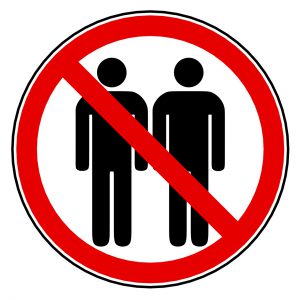Breaking up is hard to do. But which part about it is harder: losing the lover or losing the friend? If you and your used-to-be were inseparable before you parted ways, it can feel like you’re losing both, and that can be a tough pill to swallow. So what should you do? Forget the lover part and keep the friend around? Is it wise, or even possible, to stay friends with your ex once the relationship is over? This is such a burning question that experts have studied it and weighed in on it, so let’s see what they have to say.
Experts Weigh in on the Whys

Relationships are messy and complicated, and they definitely don’t stop being that way when they end. There are usually still feelings there, and it can feel like too much to simply cut your ex-partner out of your life completely when you have meant so much to each other. But it seems like there’s not much agreement on whether it’s a good idea to try and stay friends with each other. Would it feel like a poor consolation prize, a way for your ex to try and sneak their way back into your heart (or bed), or even something that’s holding you back from forming new meaningful relationships? Or could you end up with one of the deepest friendships of your life? For every person who wants to take the good stuff and forget the bad and be friends, there’s one that wants to just cut ties and run – so who’s right?
Unfortunately, it’s not that simple. There are countless anecdotes that support both sides of the argument, and even experts are split – or at least acknowledge that there is no one right answer. For example, Rachel Sussman, a New York City-based psychotherapist, advises caution when it comes to staying friends, but says there are couples for whom it works; ultimately, she says, it’s “an individual determination.”
Researchers have even done whole studies on why people remain friends with their exes, and have evaluated how successful ex-couples are likely to be when pursuing friendship. For example, a study out of the University of Kansas identified four reasons to stay friends with exes, and found that they were good predictors (along with things like attachment styles, personality traits, time since breakup, and reasons for breakup) for how likely exes were to make a friendship work:
- Security – Emotional support, trust, advice
- Practicality – Shared finances or possessions, working or going to school together, having mutual friends
- Civility
- Unresolved romantic desires
One of those should throw up a huge red flag for you – can you guess which one? The friendships based on unresolved romantic desires unsurprisingly had the most negative outcomes, while friendships based on feelings of security seemed to work the best. Staying friends due to practicality also did ok, but those friendships (as well as those based on civility) tended to be more short-term.
So that’s the general science behind how friendships between exes work (or don’t work) – but how do you know which direction you should go in? Should you get back into each other’s lives, or run for the hills?
When – and How – to Get in the Friend Zone
When can a friendship between exes work? Well, first things first: we want to point out that if you share children, you should absolutely try your best to remain on good terms (even if you’re not ever going to be bestest buddies), since you’ll be in each other’s lives long term. For couples without children, Rachel Sussman says the best candidates are those who:
- Were friends before they dated, and so have a solid foundation to their relationship
- Dated when they were young
- Dated casually or were only together for a short time
That’s not to say those are the only people being friends will work for – there are tons of outliers – but it might be easier for the above types of couples.
In addition, if it does feel right to you to try for a friendship with your ex, there are ways that experts suggest you go about it. They say you should:
- Spend time apart first – Remember that time heals, and can also allow you a lot of insight into what went down. Most experts urge you to spend a significant amount of time without contact with your ex after your breakup – and that includes on social media!
- Set boundaries – Choosing to reestablish contact and become friends is great if that’s what you want, but you will definitely need to set boundaries to make it work. For example, make it clear that the two of you can text or hang out, but not every day – daily contact might just make things too complicated.
- Make some important acknowledgments – You have to both be willing to communicate and to admit that you don’t work together as a couple. According to Dr. Christine Selby, a psychology professor at Husson University, it’s important “to recognize what worked about the relationship and what did not.” If you also agree that “what brought you together was a strong friendship, then it may be possible to reestablish the relationship as a friendship provided there is a clear understanding that neither of you wants to pursue dating [each other] again.”
- Constantly reevaluate – Australian counselor Fiona Bennett urges people to be honest with themselves and “Constantly review the friendship and the reasons for continuing it.” That’s especially true if either of you end up with a new partner: “It can be hard for a current partner to understand why you would do this when you’ve got me now. It can spark some insecurity.” Basically, it’s important to reevaluate your friendship as your lives change.
And, as Sussman points out, “More times than not, [someone who stays friends with an ex] is kind of clinging to something. It’s more of a security blanket,” so be sure to assess how the relationship really makes you feel.
And, in the end, if the friendship doesn’t make you feel good, or if it’s too much for you, it’s ok to let it go.
Friends Without Benefits: When NOT to Stay Friends
Speaking of letting go, experts also say there are situations when it might be best not to try to be friends, at least for the time being. One of those is definitely if you’ve been in a toxic or abusive relationship: if that’s the case, you should stay as far away from your ex as possible, and speak to a therapist if you’re having trouble doing so. But there are other times when it’s also in your best interest to cut ties, like when:
- One of you still has feelings for the other – As we pointed out above, no good friendships ever come out of relationships based on unresolved romantic feelings. So if you find yourself getting all dressed up to hang out with them, and thinking that maybe, just maybe, you could try again, it might be time to cut ties for a while. Take the time to grieve the loss of the relationship and feel the feelings you need to experience in order to let go.
- You still hook up, or feel like it could happen – If you feel like you’re one or two drinks away from locking lips like the old days, you’re not ready to make a clean break and start over as friends. You’re probably going to have to let that simmering sexual chemistry cool before you can even think about a new kind of relationship.

- You’re looking for or starting a serious relationship with someone new – This one might sound a little extreme – after all, friends are one thing and romantic partners are another, and you should be able to have both in your life. Turns out, it might not be that simple. For example, a study published in Social Psychological and Personality Science found that “resolving feelings for one’s most recent ex may be important for maximizing a new relationship’s potential.” In other words, having your ex around could make you less likely to give any new potential partners a real shot, especially if you feel like your ex is meeting your emotional needs. And practically, you’ll have less time and energy for meeting new partners if you’re spending all your time with a former flame.
- Your friendship feels like a consolation prize – Shifting from lover to friend can feel like a downgrade to a lot of people, and if you’re agreeing to friendship just to remain in your ex’s orbit, you might end up feeling pretty crappy about the whole deal.
- You’re overly invested in your ex’s dating life – Does it feel like a knife in the heart if you see your ex hugging on someone else in an Instagram post? Do you find yourself trying to influence them when it comes to who they date, or do you try to persuade them not to call that cutie they met at a bar? None of this is good for either of you, and is a sign you’re not ready to be friends.
To follow on the last point, and to give you one last test of whether it’s really, truly a good idea to try for a friendship with your ex, psychotherapist Dr. Jenn Mann suggests you ask yourself the following question: “If my ex met someone new and fell madly in love, would I be genuinely happy for them both?”
If you can genuinely and honestly answer “yes” to the above question, great – you’ve got the potential to have a really meaningful friendship in your life. If you can’t, that’s ok – absolutely no judgment! After all, ending a relationship can be one of the most painful experiences you can go through, and no one expects you to be some sort of emotional superhero. Just remember, however you choose to handle your breakup (and there’s not one right way to do so!), you need to put your own well-being first, and clinging to the past is never the way to do that. So proceed with caution, and do what’s best for you. And don’t forget to let us know about your experiences with being (or trying to be) friends with your exes!